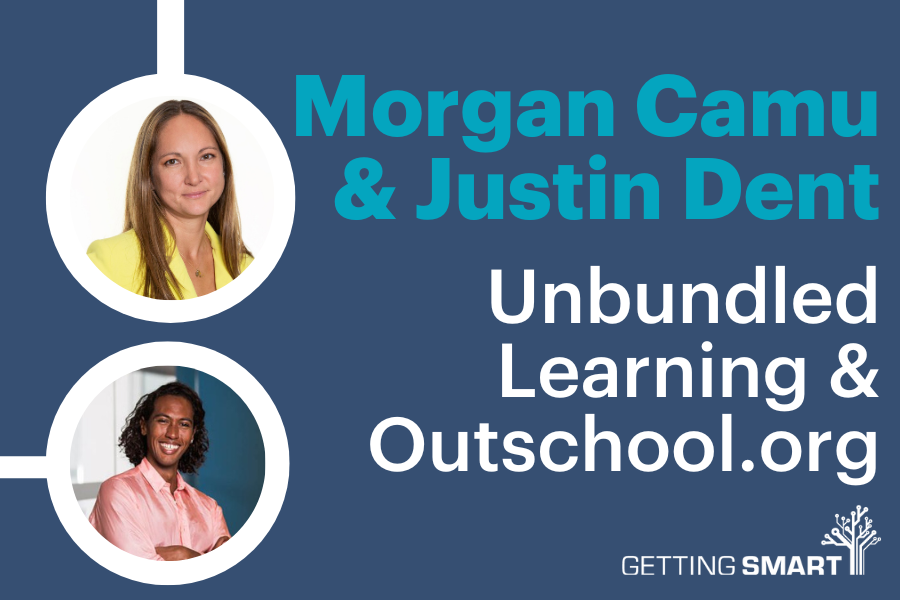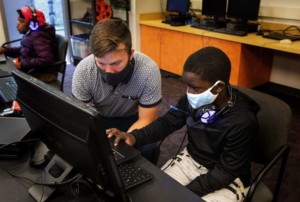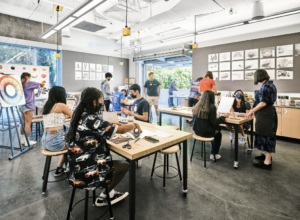Morgan Camu and Justin Dent on Unbundled Learning Ecosystems and Outschool.org
Key Points
-
Families need to have a say in which place-based providers are participating in the unbundled ecosystem.
-
We have to widen our aperture for where learning happens and what constitutes valuable learning.
-
Value the assets of a community before trying to build something new.

On this episode of the Getting Smart Podcast, Nate McClennen is joined by Morgan Camu, Head of Programs at Outschool.org and Justin Dent, founding Executive Director of Outschool.org. This non-profit branch of outschool.com is working to ensure not only access to all of outschool.com’s resources to those who are racially or economically marginalized – but is also thinking about how to support this unbundled ecosystem as a whole.
Kids are magic.
Morgan Camu
Nate McLennan: So thanks so much for being here. Let’s start with your journeys. Morgan, Justin, what has led you to education, to where you are today? Maybe, Morgan, start with you, and then we’ll go to Justin.
Morgan Camu: I came into education straight from college as a Teach for America Corps member. I taught high school science in rural North Carolina, which was literally the best job I ever had. I stayed in education because kids are magic. I saw my own story in them. I’m an immigrant and a non-native English speaker, and I worked with communities where those characteristics were common. These parents, like my own, saw education as a means for liberation and choice. So here I am, working alongside Justin and our team at Outschool.org, trying to reconstruct our education systems to better serve all students.
Nate McLennan: I love the “kids are magic” phrase. Justin, what about your journey to Outschool.org?
Justin Dent: My journey started as a kid in school. I saw my mom navigating the New York City public education system as a single parent and providing me with out-of-school learning opportunities, which I still credit for my success. I quickly realized her efforts were exceptional, and not every family had that support. In college, I became a student activist, which led to running a nonprofit supporting first-generation minority students for seven years. Now, it’s a privilege to work with Morgan and the team, advocating for families and kids daily at Outschool.org.
Nate McLennan: Let’s start with the big picture. Outschool.com is a huge platform that connects young people to teachers worldwide. Justin, how does the mission of Outschool.com compare to Outschool.org? What’s the relationship?
Justin Dent: Both share a mission to inspire kids to love learning, where students and parents can drive their own educational experiences. Outschool.org has the same North Star, but we focus on ensuring that kids facing economic and racial marginalization aren’t excluded from that mission. Our goal is to overcome systemic inequities that keep vulnerable learners from accessing resources that could change their lives.
Nate McLennan: Got it. So, Outschool.org is using the Outschool.com platform and also connecting with other educational services to achieve your mission?
Justin Dent: Yes. We connect families, learners, and community organizations to resources on Outschool.com and beyond to ensure equitable access to personalized learning. Outschool is one tool in our toolkit, but we also partner with other content providers and services that support families’ unique learning journeys.
Nate McLennan: You have some signature programs on your site, like Outbridge and Community Partner Grants. Can you explain those?
Morgan Camu: Absolutely. We just closed an RFP to select our new cohort of community partners for the fall, and we were overwhelmed by the response. Our first program, Class Connect, has been around since the start of Outschool.org. We partner with organizations that have gaps in the electives or enrichment they can provide, like Japanese, survival skills, or cooking classes, and we tailor these to the community’s specific needs.
Nate McLennan: Are you drawing from Outschool.com’s resources, or do you have to build more to personalize it for specific communities?
Morgan Camu: We do use Outschool.com’s 140,000 classes, but we also partner with other providers like Reconstruction, which offers identity-affirming content focused on the Black cultural experience. So, our library includes a variety of high-quality, affirming content providers.
Nate McLennan: Great. And what about Outbridge?
Morgan Camu: Outbridge serves families by giving them agency to craft personalized learning experiences. It includes in-person activities, and we provide funds and navigation support to help families choose online and place-based options. For instance, a child interested in science might take virtual classes and attend a local YMCA science camp, combining online and community-based learning.
Nate McLennan: Are you doing the research to find place-based opportunities, or is that done by your partners?
Justin Dent: We work with partners like Engage Detroit to determine which local organizations to include. Communities know best what fits their needs, and families benefit from navigating their learning journeys together, making it a collaborative process.
Nate McLennan: It makes sense to value local expertise and community wisdom. Morgan, could you share how programs like Outbridge and Class Connect work in practice?
Morgan Camu: Sure! Outbridge is designed for families like Leah and her son, Damayas, an engaged Detroit family. Leah used Outbridge funds to nurture Damayas’s curiosity about science, buying a child-size stethoscope, enrolling him in virtual science classes, and even getting a YMCA membership for health and wellness activities. For Class Connect, we work with groups like Heritage Homeschoolers in Georgia, led by Amber Johnston, to offer tailored enrichment programs for Black homeschoolers, like Spanish, coding, and African diaspora classes, creating a community-based, year-round learning experience.
Nate McLennan: I love these stories. They illustrate how many students could benefit from these tailored opportunities. Let’s talk big picture, Justin. Is unbundled learning for everyone, or is it only for those seeking an alternative to traditional schooling?
Justin Dent: Learning has always existed beyond traditional K-12, but the system emphasizes in-school learning. The unbundled movement highlights the learning happening outside these confines. However, without a clear North Star, there’s a risk of creating a more fragmented and exclusionary system. We need intentionality to ensure that unbundling doesn’t leave certain learners behind.
Nate McLennan: Do you partner with public schools that want to incorporate unbundling during the school day?
Justin Dent: Yes, many kids will continue to be served by public education, and we want to provide them with expanded opportunities that extend beyond the school walls, enriching their learning with resources from the broader community.
Nate McLennan: How do you think about assessment in these unbundled learning experiences, Morgan?
Morgan Camu: We believe all kids are brilliant, but traditional metrics don’t always capture that. While we track academic progress, we also look at confidence, curiosity, and resilience, and assess family agency in navigating these unbundled pathways. We use a mixed-methods approach, gathering data on engagement, attendance, and behavioral changes.
Nate McLennan: I appreciate that perspective. Let’s wrap up with some takeaways and shoutouts. Morgan, what’s your main message for our listeners, and is there anyone you’d like to amplify?
Morgan Camu: Our shoutouts go to our early partners who trusted us, like Bernita and Engage Detroit, who helped us shape Outbridge. We also celebrate the Black and Latinx homeschooling communities, like Heritage Homeschoolers and Melanin Village, who have shown what liberatory learning can look like.
Nate McLennan: Justin, any final thoughts and shoutouts?
Justin Dent: We need to widen our view of where learning happens, recognizing community organizations and alternative learning environments. My shoutout is to all micro-school and homeschooling leaders who are creating inclusive learning spaces, like Asiru of Colossal Academy, a Florida-based micro-school.
Nate McLennan: Thank you both for an incredible conversation. We’ll include links in the show notes to all the resources and organizations you mentioned. Thanks again for joining us!
Justin Dent: Thanks, Nate.
Morgan Camu: Thank you!
Links:








0 Comments
Leave a Comment
Your email address will not be published. All fields are required.